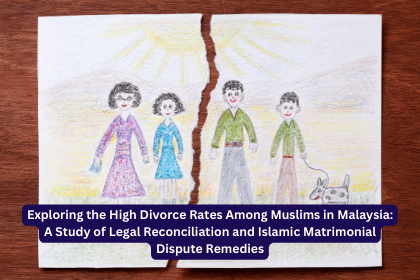Divorce rates among Muslims in Malaysia have been a cause for concern in recent years. While divorce is recognized in Islamic law as a permissible act, it is also regarded as a last resort after all other attempts at reconciliation have failed. In Malaysia, the high rate of divorce among Muslims has prompted a study into the legal reconciliation process and Islamic matrimonial dispute remedies.
The study concluded that the majority of Muslim couples who divorced in Malaysia did not access the legal dispute resolution process nor avail themselves of the Islamic matrimonial remedies provided by the state. This suggests that there is a need to make the legal framework more accessible and to increase public awareness of the options available to couples in conflict. Furthermore, the study highlighted the need for better education on the Islamic principles of marriage and family to curb the rising divorce rates among Muslims in Malaysia.
The legal reconciliation process is a key feature of the Malaysian Islamic family law system. The process involves a conciliation session between the husband and wife, which is mediated by an Islamic judge or a marriage counselor. During this session, the parties are encouraged to identify the causes of the breakdown in their relationship and to find ways to reconcile their differences. If reconciliation is not possible, then the parties may proceed with the divorce.
The Islamic judge or marriage counselor will then provide the parties with a report of the reconciliation process detailing their findings and any agreement that they may have reached. This report will then be presented to the court, which will decide whether the reconciliation process was successful or not. If the court finds that the reconciliation process was successful, then the parties will be allowed to continue living together. If not, then the court will proceed with the divorce proceedings.
Islamic matrimonial dispute remedies are another aspect of the Malaysian Islamic family law system. These remedies are designed to provide legal recourse to individuals who are experiencing marital disputes. These remedies include mediation, arbitration, and counseling services, as well as the option to seek a legal ruling from an Islamic court. These remedies are aimed at resolving disputes and preventing divorces, thereby promoting a healthy and stable family environment.
Islamic matrimonial dispute remedies are an essential part of the Malaysian Islamic family law system. These remedies are designed to provide legal recourse to those experiencing marital disputes. These remedies include mediation, arbitration, and counseling services, as well as the option to seek a legal ruling from an Islamic court. These remedies are intended to resolve disputes, help prevent divorces, and promote a healthy and stable family environment. Therefore, these remedies can be highly beneficial in resolving marital disputes and protecting the rights of both parties involved.
Despite the availability of legal remedies, the divorce rate among Muslims in Malaysia remains high. Some factors contributing to the high divorce rate include the lack of awareness of the legal reconciliation process and Islamic matrimonial dispute remedies, as well as a lack of counseling and support services for couples experiencing marital problems.
In addition, Malaysia’s patriarchal social norms and gender inequality can also contribute to the high rate of divorce in the Muslim community. Women may feel that their rights and interests are not adequately protected in divorce proceedings, leading to a greater willingness to file for divorce. On the other hand, men may be reluctant to pursue reconciliation or seek counseling out of fear of being perceived as weak or submissive. This further perpetuates the cycle of divorce within the Malaysian Muslim community.
To address this issue, efforts are being made to raise awareness of the legal reconciliation process and Islamic matrimonial dispute remedies among Muslims in Malaysia. This includes educational campaigns, community outreach programs, and the provision of counseling and support services for couples experiencing marital problems. By promoting a greater understanding of the legal reconciliation process and Islamic matrimonial dispute remedies, it is hoped that the high divorce rate among Muslims in Malaysia can be reduced, and a healthier and more stable family environment can be promoted.

